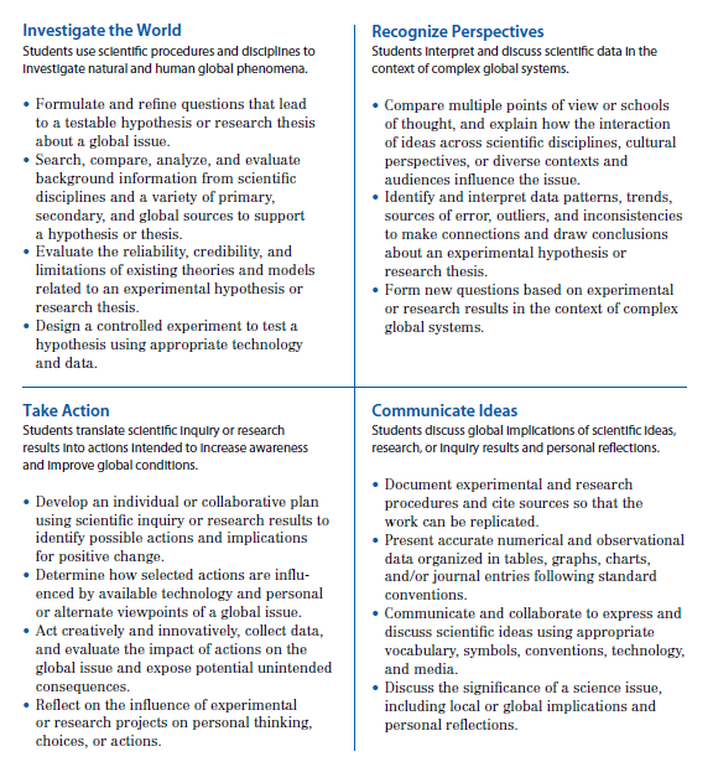Science
Climate change, population growth, pandemic diseases, nuclear arms proliferation, and pollution. Green technologies, new mobility systems, and advances in biotechnology. The globally-focused science classroom is a powerful place for students to explore the implications of these worldwide problems and opportunities.
Globally-focused teachers create a place where students learn science from interdisciplinary and global perspectives. Using a science curriculum with a global focus engages students in problem-based learning tasks and scientific investigations founded upon research in scientific literature.
Empowered by a global science curriculum, students investigate the complex biological, chemical, physical, earth-environmental, and human world systems, recognize and consider the power of divergent perspectives, communicate
about science effectively with diverse audiences around the world, and translate their scientific ideas and findings into actions that make a difference in their local community and the world.
In globally-focused schools, students explore the language, symbols, tools, technologies, and processes of science inquiry and literacy as the foundation for understanding and advancing science knowledge. Science inquiry shows
students how to initiate the inquiry, design and conduct experiments, present and analyze data, and interpret results and draw conclusions. Science literacy teaches them how to discuss a science-related issue, put the issue into context, conduct research, develop and support a thesis, discuss the implications, and communicate about the work.
Science offers the potential for medical cures and doing things better, faster, and with fewer materials. Science, however, can also be at the center of complex interrelationships between scientific results, unforeseen consequences, and ethical, legal, and social implications. To understand the impact of global issues and their current solutions, students need experience with questioning current scientific understandings and technological practices, engaging with scientists around the globe and collaborating on potential solutions to existing problems.
In a globally-focused science classroom, students learn to think like scientists. Students observe natural phenomena that cause them to wonder, ask their own questions, and test their ideas. When they interpret their data, new questions arise leading them into focused, purposeful research of the literature and to further inquiry.
The result is students who can understand, analyze, apply, and evaluate existing scientific knowledge in the context of global cultural perspectives, politics, economics, and history. Students learn to ask essential questions:
Students probe for deeper understanding and reflect on the results and unforeseen consequences of scientific progress. They take a position, argue it, and take innovative actions that make a difference in the world.
Globally-focused teachers create a place where students learn science from interdisciplinary and global perspectives. Using a science curriculum with a global focus engages students in problem-based learning tasks and scientific investigations founded upon research in scientific literature.
Empowered by a global science curriculum, students investigate the complex biological, chemical, physical, earth-environmental, and human world systems, recognize and consider the power of divergent perspectives, communicate
about science effectively with diverse audiences around the world, and translate their scientific ideas and findings into actions that make a difference in their local community and the world.
In globally-focused schools, students explore the language, symbols, tools, technologies, and processes of science inquiry and literacy as the foundation for understanding and advancing science knowledge. Science inquiry shows
students how to initiate the inquiry, design and conduct experiments, present and analyze data, and interpret results and draw conclusions. Science literacy teaches them how to discuss a science-related issue, put the issue into context, conduct research, develop and support a thesis, discuss the implications, and communicate about the work.
Science offers the potential for medical cures and doing things better, faster, and with fewer materials. Science, however, can also be at the center of complex interrelationships between scientific results, unforeseen consequences, and ethical, legal, and social implications. To understand the impact of global issues and their current solutions, students need experience with questioning current scientific understandings and technological practices, engaging with scientists around the globe and collaborating on potential solutions to existing problems.
In a globally-focused science classroom, students learn to think like scientists. Students observe natural phenomena that cause them to wonder, ask their own questions, and test their ideas. When they interpret their data, new questions arise leading them into focused, purposeful research of the literature and to further inquiry.
The result is students who can understand, analyze, apply, and evaluate existing scientific knowledge in the context of global cultural perspectives, politics, economics, and history. Students learn to ask essential questions:
- How are the results of each action changing the global system dynamics?
- What are the complex interrelationships between local causes and worldwide effects?
- Do the benefits outweigh the costs?
- Are we reflecting on the known impacts and inquiring into the unknown effects?
Students probe for deeper understanding and reflect on the results and unforeseen consequences of scientific progress. They take a position, argue it, and take innovative actions that make a difference in the world.
The goal of the ISSN Science program is to develop an individual’s capacity to research and investigate scientific ideas using the vocabulary, symbols, and conventions of science, and to explain the local and/or global implications of human interactions with natural phenomena. Students analyze, interpret, evaluate, and discuss the significance of biological, chemical, physical, or earth-environmental scientific conclusions in the context of complex global systems.

